On-Line Catalog Page 1
Conditions of Sale Mineralogy samples from the Earth's mantle are some of the rarest and most difficult geologic materials for educators, collectors and the scientific community to acquire. The samples listed are offered on a first-come, first serve basis and guaranteed to be exactly as described. All major credit cards accepted including PayPal. Checks are welcome but please email us first so that we may confirm availability and hold the material until your check arrives. |
Questions on any specimens? lab@petrologyslides.com |
| . |
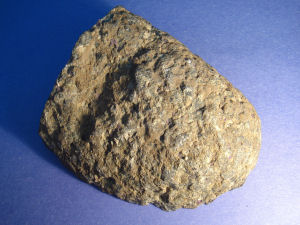 |
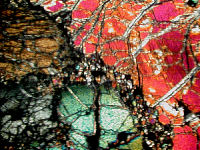 Garnet-bearing Harzburgite in thin section. |
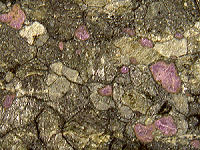 Polished surfaces are rich in pyrope garnet. |
| Harzburgite, Kimberley, South Africa, Kaapval Craton | 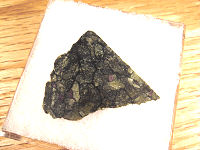 Harzburgite in display case. |
Harzburgite, an ultramafic
igneous rock, is a variety of peridotite. Garnet-bearing hartzburgite though is
far more rare, found mostly as xenoliths in kimberlite. This locality of
garnet-bearing hartzburgite is from the Kaapval Craton, in Kimberley, South
Africa and is the dominant diamond-bearing source rock. |
|
| Specimen# 1-13 | |
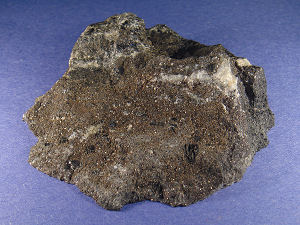 |
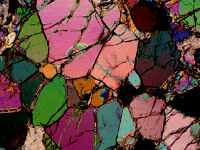 Magnetite Dunite, and Carbonatite in thin section. |
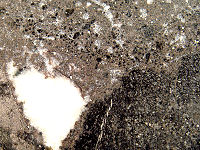 The surface textures display an attractive glimmerite. Very nice in polished pieces or micromount |
| Magnetite Dunite and Carbonatite, Cataldo Carbonatite I complex, Brazil | 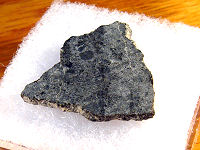 Dunite in display case. |
This is quite a rock - olivine
and magnetite megacrysts in carbonatite-brecciated olivine nephelinite! The
specimen is essentially a swarm of magnetite and olivine crystals plus
carbonatite bits in glimmerite (a mostly phlogopite matrix) from the world
famous Catalao mine in Brazil. |
|
| Specimen# 2-1 | |
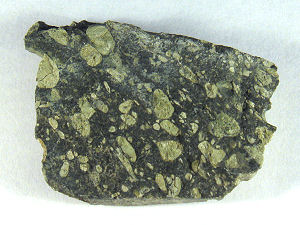 |
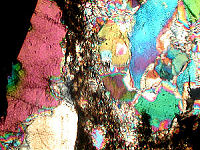 Snap Lake in thin section. |
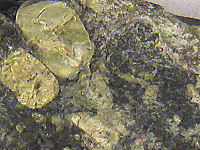 Large olivine-rich clasts in the matrix of Snap Lake. |
| Kimberlite, Snap Lake, Slave Craton, Northwest Territories, Canada | 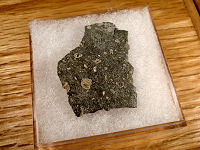 Snap Lake Kimberlite. |
The
Snap Lake hypabyssal kimberlite is a 15° inclined intrusion that intrudes
Archaean rocks of the Slave Craton. Kimberlite rocks from this locality are
pieces of deep (>250 km) lithospheric mantle. It is Canada's first
completely underground diamond mine and the only diamond mine in Canada's
Northwest Territories |
|
| Specimen# 3-5 | |
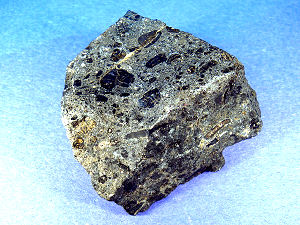 |
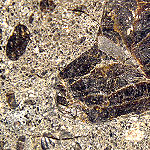 Surface texture, Kimberlite, Premier Mine. |
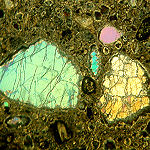 Kimberlite from Premier Mine in thin section. |
| Kimberlite, Premier Mine, Transvaal, South Africa | 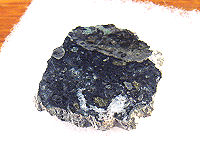 Kimberlite in display case. |
The
world famous DeBeers Premier Diamond mine of Transvaal, South Africa is the
source of the largest diamond ever found and is the best known and studied
diamond mine in the world. This kimberlite is the source rock for almost all
diamonds from this locality and due to security, samples from this mine are
enormously difficult to obtain and only available at the university level. |
|
| Specimen# 4-76 | |
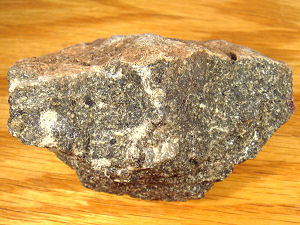 |
 Sturgeon Lake kimberlite, surface texture. |
 Sturgeon Lake kimberlite in thin section. |
| Kimberlite, Sturgeon Lake, Saskatchewa, Canada |  Sturgeon Lake Kimberlite in display case. |
Monopros, an exploration arm of De Beers, discovered the
Sturgeon Lake kimberlite in 1987. It's located 70 kilometers northwest of the
Fort a' la Corne kimberlite cluster. De Beers gave up ownership of the Sturgeon
Lake kimberlite in order to focus on the much larger Fort a la Corne
kimberlites, but although the total tonnage of the Sturgeon Lake kimberlite is
small by De Beers standards, it is exposed at the surface and does not require
extensive overburden removal. Additionally, the diamond count and valuations
make it attractive for a smaller scale surface operation. |
|
| Specimen# 5-78 | |
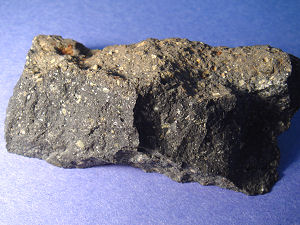 |
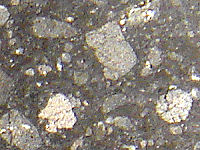 Surface texture, Indaia I Intrusion kimberlite |
 .Indaia I Intrusion kimberlite in thin section. |
| Kimberlite, Indaia I Intrusion, Coromandel, Brazil | 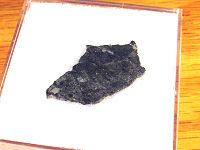 Kimberlite in display case. |
The
Indaia I intrusion, near Coromandel, Brazil kimberlites have some affinities to
ultrapotassic rocks such as ugandites and kamafugites. This kimberlite is
choked with disaggregated peridotite and there is a great deal of olivine,
ilmenite, and rounded grains of garnet. Additionally, seen in thin section,
there are microphenocrysts of magnesian ilmenite, magnesiochromite, and
perovskite. |
|
| Specimen# 6-4 | |
 |
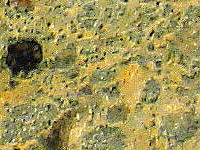 Surface groundmass, Lamproite, Ellendale #9. |
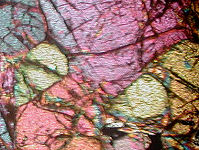 In thin section. |
| Olivine Lamproite lapilli tuff, Ellendale #9 centre, Kimberley, N. Australia | 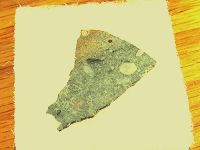 Lamproite in display case. |
Many of the discovered pipes in Western Australia have been
referred to as kimberlites but are in fact lamproites. The olivine in
lamproites is more complex than in kimberlites but both are diamond-bearing.
The groundmass minerals include phlogopite, amphibole, clinopyroxene,
perovskite, spinel, leucite, and wadeite whereas in kimberlites, amphibole,
wadeite, leucite and glass are not found. This is a spectacular
volcanological/textural specimen. Its matrix is a coarse tuff composed of
magmatic lapilli of lamproitic olivine. |
|
| Specimen# 7-6 | |
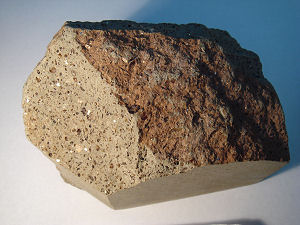 |
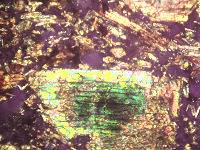 Thin section, Lamproite |
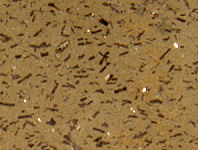 Phlogopite mica inclusions. |
| Lamproite, 81 Mile Vent, Ellendale, West Kimberley Province, Western Australia | 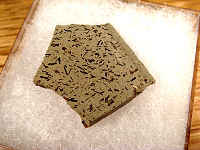 Ellendale Lamproite in display case. |
The
lamproites of West Kimberley Province occur in an area of 150 km in diameter
that includes over 100 intrusions and volcanic forms. At Ellendale, 48 dikes,
sills, plugs, and diatremes cut across Devonian and Permian sedimentary rocks.
The Ellendale features are 20-22 million years old. This particular lamproite
is from the 81 mile vent North and is full of phlogopite mica inclusions.
Visually different from every other lamproite we've seen. |
|
| Specimen# 8-8 | |
 |
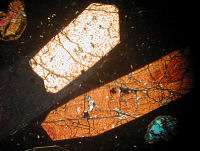 Limburgite in thin section |
 Vesicles and augite phenocryst clusters. |
| Limbergite, Kaiserstuhl Volcano, Rhine Graben, Germany | 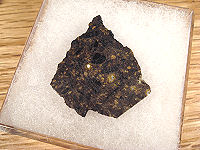 Limbergite in display case. |
Limburgite is transitional between highly undersaturated alkali
olivine basalt and nepheline and consists mainly of altered olivine and highly
titaniferous augite. Many of the augite phenocrysts are in sector twinned
clusters. The vesicles are filled with zeolites containing spherules of
iron-rich melt. From a great locality, there's a lot going on in this rock.
|
|
| Specimen# 9-10 | |
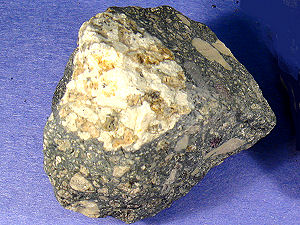 |
 Echo Bay Mine kimberlite in thin section. |
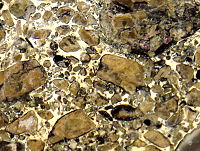 Surface matrix, microbreccia. |
| Kimberlite, Echo Bay Mine, Nunavut, Canadian Arctic | 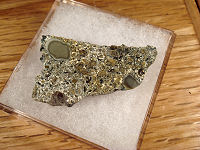 Echo Bay Kimberlite in display case. |
This rare diamondiferous kimberlite is from the Echo Bay Mine
site on Nunavut, Canada's Arctic. From the Jericho Pipe, it is rich in garnet,
ilmenite, phlogopite mica, and chrome diopside. Many inclusions. |
|
| Specimen# 10-16 | |
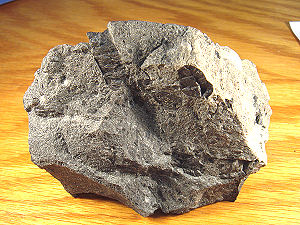 |
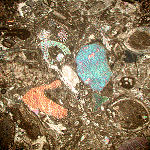 Ground mass texture, Gates-Adah Dike Kimberlite. |
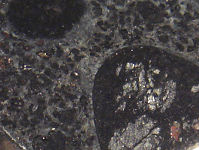 In thinsection, Gates-Adah Dike kimberlite. |
| Kimberlite, Gales Adah Dike, Masontown, Pennsylvania, USA | 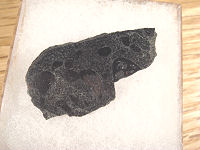 Kimberlite in display case. |
The
Gates-Adah kimberlite locality is a Jurassic kimberlite dike in Pennsylvania,
USA. The kimberlite rocks contain pyrope garnets which are a bit of an oddity
in Pennsylvania and, even more of an oddity - Alexandrite-effect pyropes.
Containing more than 3 or 4 percent chromium, alexandrite-effect pyropes take
on different colors in different light sources (The name
"alexandrite" is derived from a gem variety of chrysoberyl exhibiting
similar color change. It, in turn, is named in honor of the mineral-loving Czar
Alexander II of Russia). Alexandrite-effect pyropes in kimberlites from the
Gates-Adah Dike appear pinkish purple or raspberry-colored in incandescent
light and bluish to greenish gray in sunlight or under fluorescent light. |
|
| Specimen# 11-19 | |
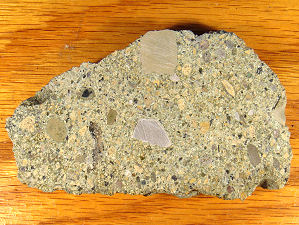 |
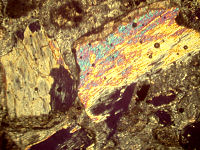 Pyroclastic kimberlite in thin section. |
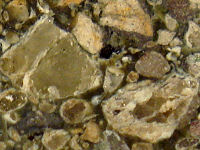 Surface matrix, pyroclastic kimberlite |
| Pyroclastic Kimberlite, Canada | 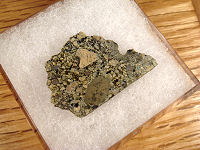 Pyroclastic Kimberlite in display case. |
This is a sample from the Victor North Pyroclastic Kimberlite
pipe located in the James Bay Lowland, Northern Ontario, Canada. It is
scheduled for open pit mining by De Beers Canada sometime in 2009. This mine
will be the first diamond mine in Ontario, and the fifth in Canada. It is
classified as a spinel-bearing carbonate Group I kimberlite with dolomite more
abundant in the matrix than calcite. |
|
| Specimen# 12-21 | |
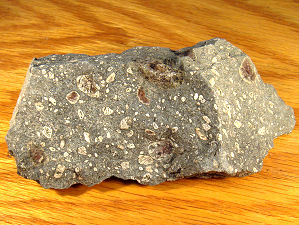 |
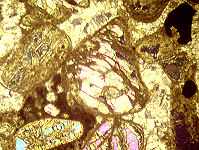 Garnet-rich kimberlite in thin section |
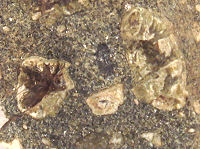 Pyrope Garnet-rich Kimberlite |
| Pyrope garnet-rich Kimberlite, Iron Mine, Wyoming, USA | 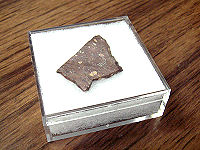 Garnet-rich Kimberlite in display case. |
The ancient core of the North American continent, the Archean craton, extends
southward from Canada and lies beneath most of Wyoming where it is known as the
Wyoming craton or Wyoming Province. This stable part of the continent is more
than 2.5 billion years old and is believed to have a high potential for diamond
deposits. This kimberlite is from Iron Mine in Albany County and is
diamondiferous. Lots of clasts and pyrope garnet in every sample. |
|
| Specimen# 13-24 | |
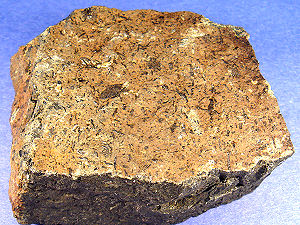 |
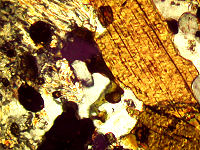 Olivine Nephelinite Lava in thin section |
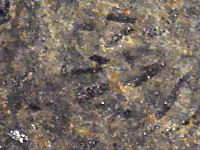 Olivine Nephelinite Lava matrix |
| Olivine Nephelinite Lava, Lodwa, Kenya | 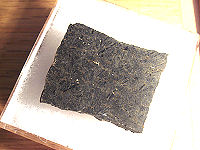 Nephelinite in display case. |
Nephelinites are silica-undersaturated, mafic, igneous rocks
consisting mostly of nepheline and pyroxene. This sample is a piece of the East
African (continental) Rift. It's a very fresh and extremely dense, unaltered
ultramafic rock of mantle origin. |
|
| Specimen# 14-25 | |
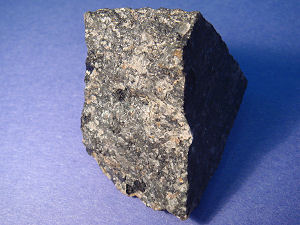 |
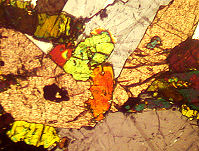 Titanite ijolite in thin section |
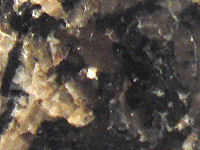 Titanite ijolite surface matrix |
| Titanite ijolite, Ice River Complex, British Columbia, Canada | 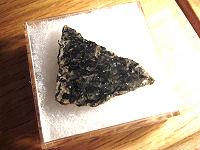 Ijolite in display case. |
The
Ice River Complex is a little known but world class intrusion in eastern
British Colombia, Canada with two magmatic series: an alkaline ultramafic one
dominated by ijolite and carbonatite and a syenitic one. This specimen is a
medium-grained rock from the ijolite series but with some characteristics
transitional to the syenite series. In addition to nepheline, euhedral titanite
wedges, and green clinopyroxene it has some minor perthitic alkali feldspar and
interstitial sodalite. This is a rare igneous rock that is beautiful in thin
section. |
|
| Specimen# 15-27 | |
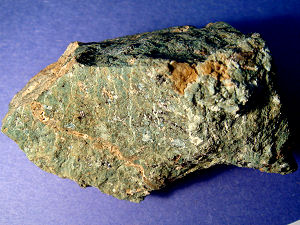 |
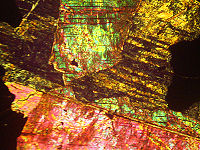 Waigidee Lamproite pegmatite in thin section |
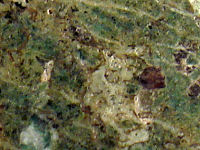 Surface, polished slice. |
| Waigidee Lamproite pegmatite, Western Australia, Australia |  Waigidee lamproite in display case. |
From the famous Walgidee Hills in Western Australia, this is
Walgidee lamproite pegmatite with outsized priderite and wadeite plus beautiful
clove-brown K-richerite. Also in matrix, Perovskite, shcherbakovite, and some
grass green diopside. A Canadian petrologist described this rock as 'one of the
coolest rocks on the planet". |
|
| Specimen# 16-28 | |
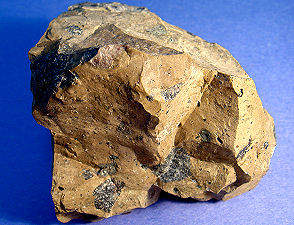 |
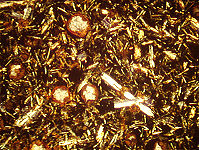 Peralkaline, superheated phonolite lava in thin sectio. |
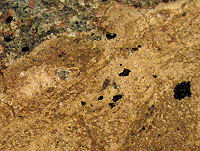 Surface texture, phonolite lava. |
| Peralkaline, superheated phonolite lava, Shombole, Kenya | 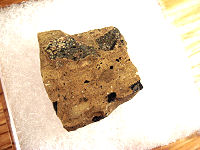 Phonolite lava in display case. |
Peralkaline, superheated phonolite lava collected from a flank
flow on the west side of the Shombole Volcano in East Africa, north of the
Kenya/Tanzania border, with inclusions of eucolite-bearing syenite. The
preferred formative theory of origin is that hot nephelinite magma intruded
beneath a syenite body, remelting it to form a supraliquidus melt which brought
up xenoliths of the selenite. |
|
| Specimen# 17-32 | |
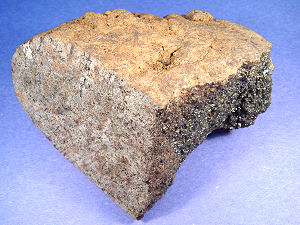 |
 Peroxenite, Mantle Xenolith in thin section |
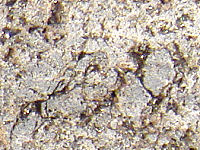 Polished surface, Peroxenite, Mantle Xenolith |
| Peroxenite, Mantle Xenolith. Mount Leura, Victoria, Australia | 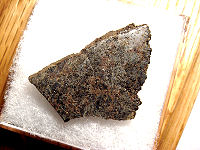 Peroxenite in display case. |
This pyroxenite mantle xenolith from the Mt. Leura, Newer
Volcanics Province in Victoria, Australia has subordinate, rounded olivine,
orthopyroxene, and clinopyroxene. There are many pockets of insitu melts which
partly crystallized to euhedral olivine and quench sprays of clinopyroxene.
Along grain boundaries, the melt has invaded in a thin film. |
|
| Specimen# 18-34 | |
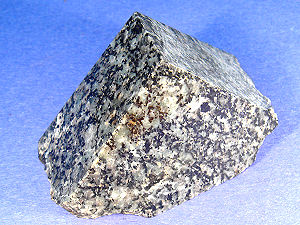 |
 Nepheline Syenite in thin section |
 Polished surface, Nepheline Syenite |
| Nepheline Syenite, Ice River Complex, BC, Canada | 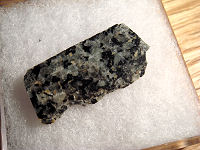 Nepheline Syenite in display case. |
Mesocratic nepheline syenite! This is another
"complicated" rock from the Ice River Complex in British Columbia,
Canada. In each polished piece, beautiful fresh blue-green nepheline and
endless euhedral titanite wedges. Additional minerals will be aegirine,
kaersutite-barkevikite, alkali feldspar, and sodalite. Polished slices or in
micromount this is a significant rock. |
|
| Specimen# 19-35 | |
 |
 |
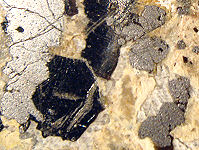 Okaite, melilitite pegmatite polished surface |
| Okaite, melilitite pegmatite. Oka Alkaline Intrusion, Oka, Quebec, Canada | 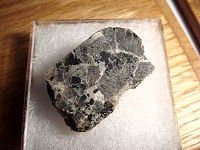 Okaite in display case. |
Okaite is an ultramafic igneous rock composed chiefly of
melilite and haüyne, with accessory biotite, perovskite, apatite, calcite,
and opaque oxides from the Oaka Alkakine Intrusion in Oka, Quebec, Canada. The
matrix is dominated by large clasts of melilite and calcite along with biotite
and magnetite |
|
| Specimen# 20-36 | |
On-Line Catalog Page 1
| 1 | 2 | 3 | 4 | 5 | 6 | 7 | 8 | 9 | 10 |